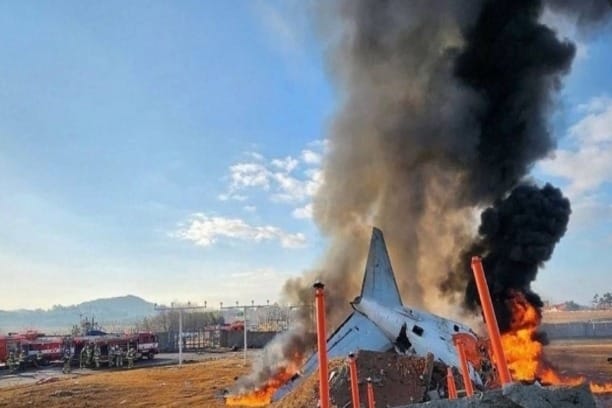
Jeju Air Flight 2216 Tragedy: Dozens Dead in Muan Airport Crash
(EPICSTORIAN) – A Jeju Air Boeing 737-800, operating as Flight 2216 from Bangkok to Muan International Airport in South Korea, crashed during landing on Sunday, resulting in a catastrophic fire and significant loss of life.
The aircraft, carrying 175 passengers and six crew members, skidded off the runway, collided with a concrete barrier, and burst into flames. Emergency responders have confirmed at least 96 fatalities, with only two survivors rescued from the wreckage.
The incident unfolded at approximately 9:07 a.m. local time at Muan International Airport, a key regional hub in South Korea’s South Jeolla Province. Visuals from the scene depicted plumes of black smoke rising from the crash site as firefighters battled the ensuing blaze. Rescue operations are ongoing, with authorities striving to account for all individuals on board.
Jeju Air’s CEO, Kim E-Bae, expressed profound remorse, stating, “First, I bow my head and offer my sincere apologies to everyone who has supported Jeju Air. Above all, I express my deepest condolences and apologies to the passengers who lost their lives in the accident and to their bereaved families.”
Preliminary investigations suggest that a bird strike may have led to a malfunction of the aircraft’s landing gear, contributing to the crash. Bird strikes pose significant risks to aviation safety, potentially causing damage to aircraft and endangering passengers and crew.
In the United States, engines are the component most frequently damaged by bird strikes, accounting for 27% of all damaged aircraft components from 1990 to 2019.
Acting President Choi Sang-mok, appointed interim leader following a recent political upheaval, has ordered comprehensive rescue efforts and pledged full personnel and equipment support. This tragedy marks one of the most severe aviation disasters in South Korea since the 1997 Korean Air crash in Guam.
The crash of Jeju Air Flight 2216 follows a similar incident on December 25, when an Azerbaijan Airlines flight crashed near Aktau in Kazakhstan, resulting in 38 fatalities. These consecutive tragedies underscore the critical importance of stringent safety measures and thorough investigations to prevent future occurrences.
As the investigation into the Muan crash continues, authorities are focusing on determining the exact cause of the landing gear malfunction and assessing the potential role of bird strikes.
The aviation industry has been grappling with the challenges posed by wildlife strikes, which have been increasing in frequency.
In 2023, the U.S. Federal Aviation Administration reported 19,400 wildlife strikes, up from 17,190 in 2022. Despite the rising number of incidents, updated strategies and deterrents have led to a reduction in damage to aircraft.
Jeju Air, a budget carrier founded in 2005, has pledged full cooperation with investigators and a commitment to resolving the situation. The airline has expressed deep apologies and is expected to face intense scrutiny as details of the crash emerge.
Also Read: China Slashes Import Tariffs to Boost Domestic Demand and Global Trade in 2025
While the coming days will be crucial in uncovering the factors that led to this tragedy and in implementing measures to prevent such incidents in the future, the disaster has prompted a national reflection on aviation safety standards and emergency response protocols.






